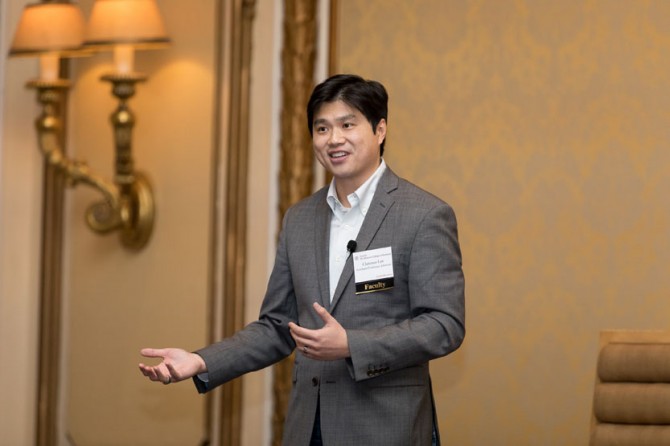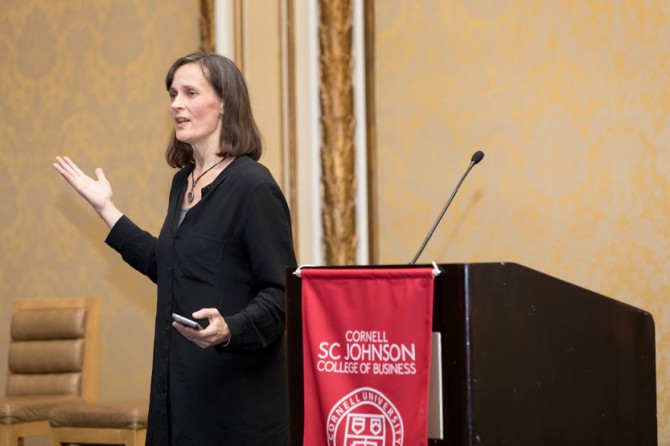Business faculty weigh the promise, pitfalls of technology
By Amy DerBedrosian
For some car buyers, the wait for their purchase to arrive can feel agonizing. But using technology, BMW customers can track their car’s progress from the factory floor through delivery.
The pleasure they take from this experience illustrates what Helen Chun has learned from her research: Anticipation can enhance the consumer experience. The associate professor of services marketing at the School of Hotel Administration points out, however, that anticipation is not the only factor that influences enjoyment.
“There’s an interplay of anticipation, the actual experience and the memory afterward. We have a deep-rooted desire to create a memory-maker for pleasure,” Chun said during a Jan. 18 alumni event in San Francisco. The discussion brought together graduates and faculty from Hotel School, the Charles H. Dyson School of Applied Economics and Management and the Samuel Curtis Johnson Graduate School of Management.
The professors’ presentations considered where technology is heading tomorrow. Pointing to data, experiences and the process of innovation, they weighed the promises and pitfalls of technology for consumers, business and society.
Clarence Lee, an assistant professor of marketing at Johnson, studies the entirety of experiences with a brand, a concept that marketers refer to as the customer journey. Drawing on his background in computer science, engineering and business, Lee applies machine learning and econometric models to digital marketing and consumer behavior, focusing on how to add value for customers and keep them coming back.
Lee’s latest project asks whether it is possible to predict the success of patents. But he has an additional objective. Lee explained, “My goal is to piece together how the tools I use may help us better develop innovations and inventions in the coming age powered by artificial intelligence. What if we can use the advances in deep learning to supercharge the strategic and customer analysis that CEOs rely on to make crucial decisions? What if we can use AI as a friendly guide to figuring out potential solutions for society? The problem I’ve set out to study is innovation – driving the process of innovation in our country.”
Chun has started exploring how technological opportunities can create enriching customer journeys. She noted that the hospitality industry is experimenting with this type of technology, such as the app for the Hilton Honors rewards program that allows customers to see the view from rooms before making a selection.
Chun cautioned against applying technology universally, however: “There is a fine line between using new technology like virtual reality as an effective tool to engage consumers and dampening someone’s desire to experience something … . Virtual reality does not seem to enhance the experience much for those who are high visualizers and already good at coming up with their own imagery, while low visualizers are helped by virtual reality. So a one-size-fits-all solution doesn’t cut it.”
Aija Leiponen, associate professor at Dyson, is visualizing how massive quantities of largely unread data can become a major economic commodity. “It’s cheap to capture and store data, but a lot of companies are wondering about the next step,” she said. “Most data is never read by a human or a machine, and of the data that is read, very little is shared or commercialized. I’m looking at what prevents companies from using this data to take advantage of opportunities.”
One opportunity that interests Leiponen is the internet of things – connected everyday physical objects with the capacity to generate and share data. But, as she told the audience, such a network raises questions.
“Data has to be about something. We call this inalienability. Data has to be connected to something else – unlike a product, which has value in itself,” said Leiponen. “But then there are issues of privacy and confidentiality. What happens if a third party gets data and shares it? The responsibility isn’t clear. But it raises another issue: non-excludability. Inalienability and non-excludability are creating big obstacles in sharing data.”
As much as she and the other faculty presenters are focused on digital matters, they also recognize the value of the human element.
“A model is only as good as the data you feed it, and data is only as good as the humans behind it,” said Lee. “At the end of the day, we’re humans connecting humans. We can sometimes lose sight of that.”
Amy DerBedrosian is a freelance writer for the Cornell SC Johnson College of Business.
Media Contact
Get Cornell news delivered right to your inbox.
Subscribe


